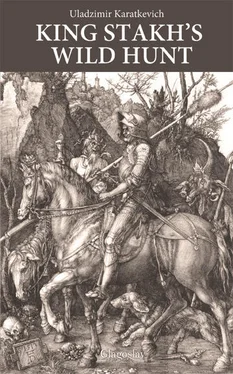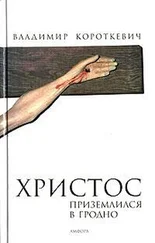This ridiculous grumbler (I can't think of any other word, most certainly considered the death of a person only a “magnifying of life's horrors.”
“And I think,” I said vehemently, “that it is necessary to hand this case over to the court, that a legal investigation must be instigated. Here we have to deal with malicious intent. Here people are driven mad, of course with a definite aim in view. This gang holds the entire neighbourhood in terror, terrifies and murders people.”
“Now do-on't, sir, no good going on like that, sir. This makes the people become more moderate. According to rumour, the murdered one was a follower of Bacchus, given to drinking and merrymaking. And it is dangerous to manifest obvious sympathy for such fellows. A political suspect, disloyal, not trustworthy and obviously, a separatist, taking the part of the mužyks, how should I put it?... bewailing his younger brother.”
I was furious, but for the time being held myself in check.To quarrel with the police would be the last straw.
“You don't wish to intervene in the case concerning the murder of Śvieciłovič?”
“God forbid, God forbid!” he interrupted. “It's that we simply doubt whether we can unravel this case, and we cannot compel our investigator to do everything in his power to solve the case of a man whose ideas were directed in quite an opposite direction to those of all honest, loyal sons of our country.”
And with a charming smile he waved his hand in the air.
“Alright. If the Imperial Russian Court does not wish to force the investigator to establish the truth in the case of the murder of Śvieciłovič, an aristocrat, then perhaps it will wish to force the investigator to unravel the case concerning the attempt to deprive Nadzieja Janoŭskaja, the owner of Marsh Firs, of her sanity and her life?”
Comprehensively he looked at me, turned pink at some pleasant thought, and smacked his lips several times, lips fat and moist, and asked:
“But why are you taking such pains for her sake? You've decided, most certainly to make use of her yourself, haven't you? And why not? I approve of that: in bed she is, most probably, not bad.”
The blood rushed to my face. The insult to my unfortunate friend, the insult to a beloved one, whom even in my thoughts I could not call mine, became united into one. I don't remember how a whip came to be in my hand. I choked with fury.
“You... you... skunk!”
And with all my might I dealt him a blow on his dark-pink face.
I thought he would take out his revolver and kill me. But this strong fellow only groaned. Once again I struck him across his face and threw the whip away in disgust.
Like a bullet he flew out of the room into the yard in great haste and only about half a kilometre away did he cry: “Help!”
When Ryhor learned about everything, he didn't approve of what I had done. He said that I had spoiled everything, that I'd most certainly be called out to the district on the following day, and would be imprisoned for a week or banished from the region. But I had to be here, for the darkest nights had set in. I had however, no regrets. I had put all my hatred into that blow. And even if the district officials didn't lift a finger to help me, still, now I knew well who was my friend and who my enemy.
Other events of this and the following day vaguely imprinted themselves on my memory: good old Dubatoŭk, bitter tears choking him as he cried over the dead youth, and still hardly able to move after the “treat” I had given him; Miss Nadzieja standing at the coffin, wrapped in a black mantilla, so beautiful, so pure in her mourning.
As if in a dream I afterwards recalled the funeral procession. I was leading Janoŭskaja, holding her by the arm, and against the background of the grey autumn sky people walking with heads bared, the twisted birches throwing their dead, yellow leaves at the feet of the people. The face of the murdered man floating overhead.
Peasant women, mužyks, children, old men following behind the coffin, and a quiet sobbing sounding in the air. In front of us Ryhor carrying on his back a large cross made of oak.
And louder and louder still, soaring upward over the entire mourning procession, over the wet earth, the bewailing voices of the women.
“But to whom then have you left us? And why have you fallen asleep, our own, our dear one? And why are your clear eyes closed, your white hands folded? And who then shall defend us against the unjust judges? While the aristocrats all around are merciless, no cross on them! Our beloved one, where then have you flown to, away from us, for whom have you deserted us, your poor little children? As if there were no brides for you all around, that you had to go and marry the earth, you our darling? And what kind of a hut have you chosen for yourself? No windows in it, no doors, and not the free sky over the roof — only the damp earth!!! And not a wife at your side — a cold board! Neither girl-friends there nor a beloved one! Then who will kiss you on the lips, and who will comb your little head?! And why have the little lights grown dim? And why are the conifers reproving? It's not your wife crying, your beloved! After all it's not she who is weeping, wasting herself away. It's people, good people, weeping over you! It's not a little star that's lit up in the sky! It's the tiny wax candle in your little hands that's begun to glow!”
The coffin was accompanied by such sincere lamentations and weeping from the people of the neighbourhood, by moaning and groaning that cannot be bought from professional wailers.
And here was the deep grave. When the time came to leave, Janoŭskaja fell on her knees and kissed the hand of the man who had perished for her sake. It was with difficulty that I tore her away from the coffin when the people began lowering it into the grave. About three dozen peasants dragged over an enormous grey stone on runners and began to pull it up the hill where the lonely grave had been dug. A cross was carved on the stone and also the name and surname — in crooked, clumsy letters.
Lumps of earth began to thunder against the cover of the coffin, hiding the dear face from me. Then the enormous grey stone was placed near the grave. Ryhor and five peasants took old guns and began to shoot into the indifferent sky. The last of the Śvieciłovič-Janoŭskis had floated off into the unknown.
“Soon the same will happen with me, too,” Janoŭskaja whispered to me. “The sooner the better.”
The shots thundered. Like stone were the faces of the people.
Then, in accordance with an ancient custom among the gentry, the family coat of arms was smashed against the tombstone.
The family remained without a future. It had become extinct.
I felt that I would go mad if I did not occupy myself in searching for and finding the guilty ones, and didn't punish them. If there is no God, if there is no justice to be found among the authorities, I myself will be both God and Judge.
And by God, hell itself will tremble, if they fall into my hands: I shall pull out the sinews of the living.
Ryhor said that his friends were searching in the Reserve, that he himself had examined the place of the murder and found there a cigarette butt. He had also found it was a tall, slender man who had smoked the cigarette under the pines while awaiting Śvieciłovič.
Besides that, he had found a paper wad from the murderer's gun, and also the bullet that had killed my friend. When I unfolded the wad, I became convinced that the scrap of paper, too thick to be from a newspaper, was most likely a piece of a page from a journal.
I read:
“Each one of them is guilty of some offence when they are led to be executed. Forgive me, Your Highness, you've forgotten the crucifixion... Forgive me, God has deprived me of my reason...”
Читать дальше



